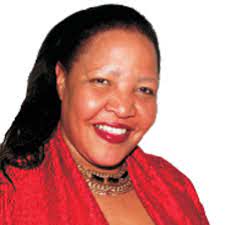Dr Masizana’s CODATA Membership to Boost University of Botswana Global Standing
 University of Botswana immediate Head of the Department of Computer Science, Dr Audrey Masizana, is confident that apart from promoting the mandate of the Committee on Data (CODATA), her contribution as an executive member will also boost the University of Botswana's global standing.
University of Botswana immediate Head of the Department of Computer Science, Dr Audrey Masizana, is confident that apart from promoting the mandate of the Committee on Data (CODATA), her contribution as an executive member will also boost the University of Botswana's global standing.
"First is to remind myself that the representation goes beyond Botswana," explains Dr Masizana who was elected to serve in the CODATA executive committee beginning November last year up to 2023. CODATA is a structure under the International Science Council (ISC) whose mandate is to help the ISC to realise its vision of advancing science as a global public good. Consequently, Dr Masizana says as a CODATA institutional member the University of Botswana is inherently in the executive committee and that will certainly project it to global visibility.
“The University having led Botswana to be the second country to host the IDW in 2018 which was a CODATA initiative, has also created some legacy that is already noted by many around the world. My executive committee membership will be looking out to create liaisons between CODATA activities with existing and relevant national projects here in Botswana,” explains Dr Masizana.
She adds that she will use her membership to help promote awareness of the general CODATA mandate which is to drive international collaboration in advancing Open Science to improve data availability and usability in all areas of research.
She says it is very humbling to have been nominated to serve in the committee especially that it was peer nomination from fellow researchers from around the world. “It is still difficult to digest. This is also coupled with a nervous anticipation of the big expectation that comes with it,” reckons Dr Masizana.
Nonetheless, she says it provides her with a once in a life opportunity to be participatory, at a strategic level, in the global task groups that CODATA implores to develop instruments and standards for the world to adopt. As part of her roadmap, her aim is to align with those whose agenda addresses issues associated with technical and scientific challenges of data in research and practice, in particular those closer to Botswana, SADC region and Africa in general.
Regarding her future plans once her term ends, she says she will continue as an ordinary member of CODATA besides participating in driving mandates of platforms such as the Africa Open Science (AOSP) and Viz Africa Network as part of her quest to follow her passion as a promoter of the Open Science movement.
Overall, Dr Masizana sees her appointment to the CODATA executive committee as an encouragement to other women in science that serves to advocate an improvement on the status of women participating in strategic international committees. Consequently, this will help in getting rid of the stereotype that these committees should be male driven. “I hope this inspires a few,” says Dr Masizana.
Apart from being Head of Department of Computer Science, Dr Masizana has over the years served in various University of Botswana’s transformational committees that proposed innovative solutions around eLearning, Digital Scholarship and Technology Adoption. She holds a PhD in Computer Science from UMIST (2004) UK, MSc (Computer Science) (1998), Post Graduate Diploma in Advanced Computing (1997) from Oxford Brookes University UK and BSc (Hon) Mathematics Modelling and Computing (1994) from Kingston University UK. Her professional certifications include Data Science, Design Thinking and ERP Education.
In relation to CODATA, Dr Masizana has served in a committee that formed part of the first structure that established the African Open Science Platform in 2017. The initiative provided her with an opportunity to contribute to the development of the Africa Open Science Framework designed for continental adoption. She is also one of the innovators of the VizAfrica Network that was established as a spinoff project of the VizAfrica Conference in 2019 which was delivered in collaboration with CODATA.
Dr Masizana is passionate on this initiative that has been designed to be a networked body of knowledge and expertise that nurtures continual conversations on issues around Data Visualization theory, policy, technology and practice in Africa. She is also currently instrumental in promotion and maintaining of CODATA collaborative engagements in Botswana and very passionate to continue playing this role for the consortia within the African landscape, thus contributing towards the expansion and strengthening of the organization’s engagements beyond.